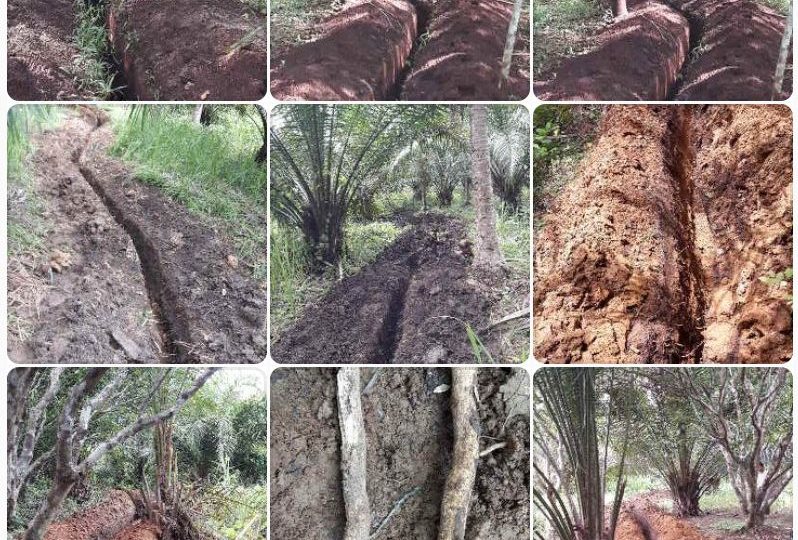A deep, brown gash cuts through an otherwise lush, green landscape, where dozens of now-dying rubber trees once stood. Inside the gash lies a length of fiber optic cable, placed there earlier this month by workers for the military-linked telecoms operator Mytel.
The plantation’s owner, along with several other farmers in the southern Kayin State township of Payathonzu, say the Mytel workers swept onto their land without warning and without permission. Even after confronting the company, the farmers say they have received no guarantee of compensation.
“When I asked [the workers] if they had notified land owners [that they would be installing fiber optic cables on our land], they said they had informed the village administrators. But the village administrator did not notify us at all,” said rubber farmer Myat Khine, who woke up to find the workers tearing up his trees and excavating his property in early June. When he asked the workers to stop and negotiate with him first, they ignored him. They ended up destroying 93 of his trees.
“We don’t know what kind of permissions they received that allowed them to continue the excavation,” he told Coconuts.
Mon Mon, a pomelo farmer in Payathonzu, which lies adjacent to the Three Pagodas Pass on the Myanmar-Thailand border, said she also confronted the workers as they were digging through her family’s plantation. The workers ignored her pleas to either stop or present proof that they had permission to dig there.
“They told us they were doing it to bring better communication to the public,” she told Coconuts.
“Now that we have experienced it ourselves, we realize that what people have been posting [on Facebook about Mytel] was not exaggeration,” Mon Mon said, adding that she has begun coordinating with other local farmers to respond to Mytel’s illegal excavation of their land.
Myat Khine, the rubber farmer, says he also wants to bring Mytel to justice, but he doesn’t know who to turn to, since administrative authority in Payathonzu Township is shared between the Myanmar government, the military, and the Karen National Union (KNU) – and Mytel says it has received permission to excavate in the area from all of them.
“Since we are in a grey area, the villagers do not know who to report or complain to,” Myat Khine said. “People here have a low level of awareness, so some just think that what Mytel did was part of a government project. They don’t want to speak out because they fear it might be a government project.”
He added: “I just want to tell Mytel to take responsibility for what they did.”
‘Responsible operator’
Mytel, which is co-owned by Viettel (which is, in turn, owned by Vietnam’s Ministry of Defense), a Myanmar military-owned conglomerate, and a consortium of 11 other Myanmar companies, launched in Myanmar on June 9. Since then, the company has been aggressively expanding its service coverage across the country. Within this month alone, the company has announced that it had reached 70 percent national coverage, signed up over a million users, and spent US$1 billion boosting its infrastructure and improving services.
But the company has been beset by controversy since opened for business. A loose movement of Myanmar netizens has launched a viral campaign to boycott Mytel over its decision to offer phone numbers that begin with the digits 969, which symbolize Myanmar’s anti-Muslim movement. Critics of the company have even created a mobile app that blocks calls from Mytel SIM cards. (It works.)
However, less viral have been the criticisms stemming from the possibility that Mytel’s profits will enrich the leaders of Myanmar’s military, many of whom stand accused of crimes against humanity committed against the country’s own inhabitants.
When asked why the company had ordered the excavation of private land in Payathonzu without seeking the permission of its owners, a Mytel spokesperson told Coconuts: “We have to acknowledge that this is one of the challenges that every tower company has to encounter…Mytel is a responsible operator in terms of infrastructure and business development. Before going into different towns across Myanmar, Mytel seeks approvals from township administrative offices, district administrative offices, and state government offices. Only with permissions from respective offices and land owners, Mytel proceeds to install fiber cables.”
The spokesperson went on: “Upon receiving enquiries from Coconuts, a Mytel technical team has made ground checking and met with a Payathonzu Township officer again on June 15, 2018, to make sure the local residents and surroundings are not affected in any case.”
Local farmers say the visit has not – and probably will not – reverse the losses they suffered at Mytel’s hands.
Myat Khine, who has valued the 93 rubber trees he lost at K3.7 million (US$2,770), said that compensation claims forms distributed by Mytel in Payathonzu only allow victims to claim a quantity of trees or an area of land.
“We are not allowed to fill in the value of our losses,” he said. “They’re not very transparent.”


